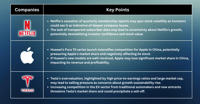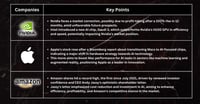In line with market expectations, the Federal Reserve (Fed) announced its decision to maintain interest rates, relieving investors. Following a series of ten consecutive hikes, the Fed's indication of two more potential rate increases this year suggests the end of the tightening cycle may be in sight. Contributing to this sentiment is the Consumer Price Index for May, which registered its lowest level in two years.
Notably, the technology sector demonstrated resilience during the week, with companies such as Adobe, Nvidia, and Microsoft experiencing significant gains. Despite initially bearing the brunt of the Fed's rate-hiking campaign, these stocks rallied, reinforcing optimism among analysts regarding the continuation of the AI trend. Investors are likely to prefer US stocks as global central bank policies diverge.
On the economic front, Friday brought positive news for inflation and consumer expectations. June saw a decline in consumer inflation expectations, with one-year assumptions for price pressures dropping from 4.2% in May to 3.3%. The University of Michigan Consumer Sentiment revealed a headline reading of 63.9, surpassing Dow Jones' estimates of 60.2. However, Friday's stock market session experienced volatility due to various factors, including stock options, index futures, and index future option contracts.
Overall, the Fed's decision to maintain interest rates provided a welcome signal to investors concerned about further tightening. The ongoing rally in the technology sector is particularly encouraging, considering its initial vulnerability to the Fed's actions. Market sentiment remains favourable regarding the potential of AI and other emerging technologies to bolster US stocks, even though some caution against excessive optimism could lead to an overextended market.
Of course, investing in tech companies entails risks. Their stocks appear to exhibit high volatility, susceptible to rapid fluctuations in response to broader market changes. Moreover, there is always the possibility of new technologies falling short of expectations, resulting in significant losses for investors.
The tech sector is crucial in driving job growth and fostering innovation within the US economy. Many of the nation's fastest-growing companies operating in the technology realm contribute to creating numerous high-paying jobs. These fuel economic expansion and positions the US as a leader in various technological domains.
The Fed's decision to refrain from rate hikes also carries implications for other sectors, including housing. With lower interest rates, the cooling housing market may experience a boost, countering the adverse effects of rising prices and sluggish wage growth.
However, concerns persist regarding the potential for continued inflationary pressures. The tight labour market and ongoing tariff impact on some industries raise apprehensions that inflation could go on. Some analysts view the Fed's decision to hold rates steady as a potentially riskier move and express worries that the central bank may lag in managing inflation expectations.
Fullerton Markets Research Team
Your Committed Trading Partner














